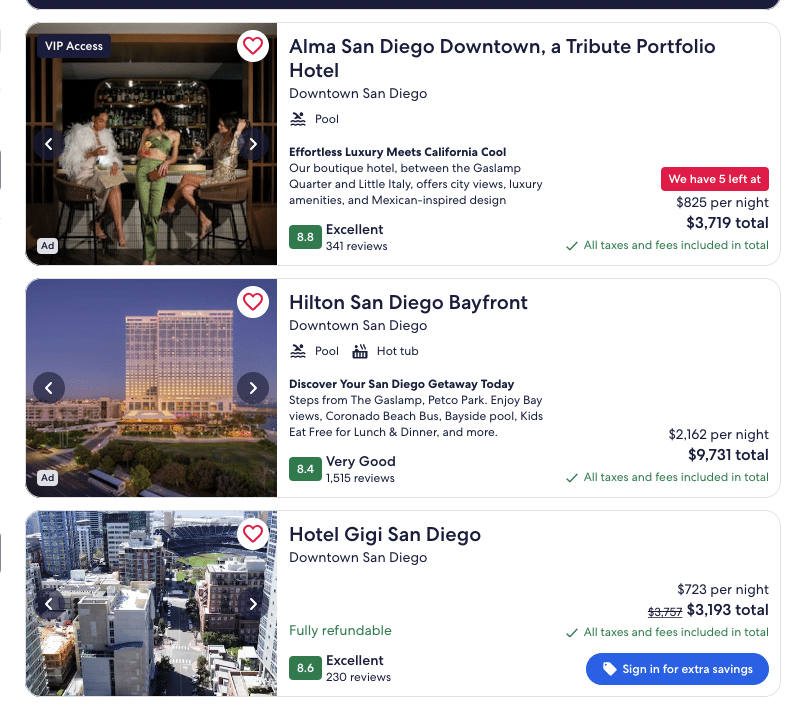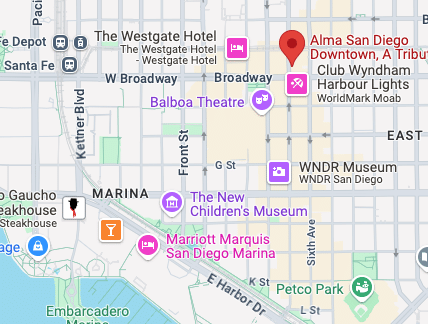Yesterday I took a look at the San Diego Convention Center’s annual reportand did a little number crunching on some of the top earning events held in the city. The #1 is, of course, San Diego Comic-Con with a local economic impact of $161.1 million for the 2023 show – and doubtless even more for ’24.
Along the way, I noted that the American Society of Hematology is holding its annual meeting this week in San Diego, and I was able to check their list of hotels. There are several hotels on the ASH list that aren’t available for Comic-Con, which I found odd.
Now I’ve been informed by knowledgeable sources that this is an ongoing trend – San Diego hotels have been reducing the number of rooms available in the convention block – or pulling out of being available entirely.
To say this is worrying is an understatement. Room rates through the convention are high, but generally market price. Room rates OUTSIDE the con block…well, it’s not uncommon to see $1000 a night for close hotels. In fact a quick look right now at Hotels.com showed that rates for that week are already hitting the stratosphere – $2,162 per night for the Bayfront!
Yikers! It should be noted that these are the current per night charges, with all the extra fees added in – California recently passed a law mandating that hotel room prices shown have to include all the fees.
One the one hand, human nature being what it is, you can’t entirely blame hotel owners for being greedy. Despite the modest and modest estimate that each Comic-Con attendee spends only $1193 per person, every hotel room from downtown to Mission Valley is booked solid, and high demand means high prices.
The shrinking hotel room block is of great concern to SDCC showrunners as well. The con’s contract with the city is coming up for renegotiation, and hotel rates are the biggest area of contention. With fewer hotel rooms available at the con rates, the show is once again looking at options.
The con has signed on for 2025 and renewed for 2026, but won’t sign a two-year agreement until the hotel situation is resolved. And many local politics are at play.
“Many of the hotels downtown have been incredibly wonderful to us,” Glanzer told Forbes in a now paywalled story. “They’ve allowed us to use meeting space, they’ve given us huge room blocks, they’ve kept their rates very competitive. But it’s tough when those hotels offer a competitive rate and then a hotel that chooses not to be in the room block charges an exorbitant amount of money. That means the people who work with us end up losing out.”
The San Diego Union Tribune can a survey called “Is it fair for Comic-Con to demand that hotels offer discounted rooms?” and most local economists and politicians said “yes.”
David Ely, San Diego State University
FORKS: Without prior agreements, hotel rates would jump during Comic-Con due to surging demand. It is fair for the organizers to negotiate the best hotel rates possible for the attendees and to minimize the risk that pricey hotels will lead to diminished turnout. We should expect Comic-Con organizers to assess whether the event could be more successful in another city and to be open about what it will take for San Diego to be competitive.
Phil Blair, Manpower
FORKS: As a past chair of the Convention Center there are lots of ways to fill the building and bring money into San Diego. One is high paying, therefore very profitable, medical conferences. The other extreme is Comic-Con. Their huge audience cannot afford expensive hotel rooms so SDCC has a hard decision to make every year. But there is no other event like Comic-Con that brings San Diego the worldwide exposure and visibility that money cannot buy. It’s also one time that San Diegans get to participate in Convention Center activities.
Executives
Gary London, London Moeder Advisors
FORKS: Sounds like a negotiating tactic to me that will likely resolve closer to 2025. “Enticing” people to come to San Diego is not a credible excuse: conventioneers always prefer San Diego. Broadly speaking, hotel prices skyrocketed post-COVID-19 and have remained sticky. Obviously operating costs have increased, necessitating a rise in hotel prices. Much of this stickiness remains because travelers have yet to push back. This is an example of a market pushback.
These don’t actually sound like resounding yeses, but okay.
While Comic-Con leaving San Diego still sounds like a long shot, if more and more people are asked to pay $800 to stay at the Alma, I do think it will have a chilling effect on the event – and there will be continued pushback. While Reddit is a vale of tears and endless complaints about everything, I saw more and more griping about costs and hotel rooms and threats to stop attending. From conversations I’ve had, even nerdlebrities and studio people are likely to balk at paying $800 a night to stay at the Alma! Just as comics folks have gradually packed up their longboxes and left SDCC, the folks who go for the collectibles and panels are also beginning to say “Enough!”
But bear in mind, other unique experiences, like Wrestlemania, are also raising ticket prices, to shock and grumbling. It seems that since we’re living in a plutocracy, the spectacle events are getting more and more expensive. I’m not familiar with the ebb and flow of hotel prices for other big events like Sundance and SXSW, but a check of the Sundance hotel page shows rooms from $450 to $4000 at night. SXSW prices are more in line, with many options around $300-400 a night.
Comic-Con is a truly memorable experience, maybe even a once in a lifetime one for many people, but it’s still more proletarian than Sundance and SXSW. Partly because it’s more or less open to anyone, getting a ticket and lodging has become increasingly stressful as more and more people want to go. But Glanzer isn’t wrong: having fewer affordable hotel rooms available will definitely dampen enthusiasm. And I can tell you right now: comics publishers aren’t going to pay $800 a night for a room at the Alma either. (I’m sure the Alma is nice but it is NOT that close to the convention center.)
At any rate, hotel negotiations are underway and could have a big impact on the future of SDCC. Local experts and con-goers alike agree: securing hotel room blocks and stable prices for Comic-Con is important for the event to continue to grow and evolve.





